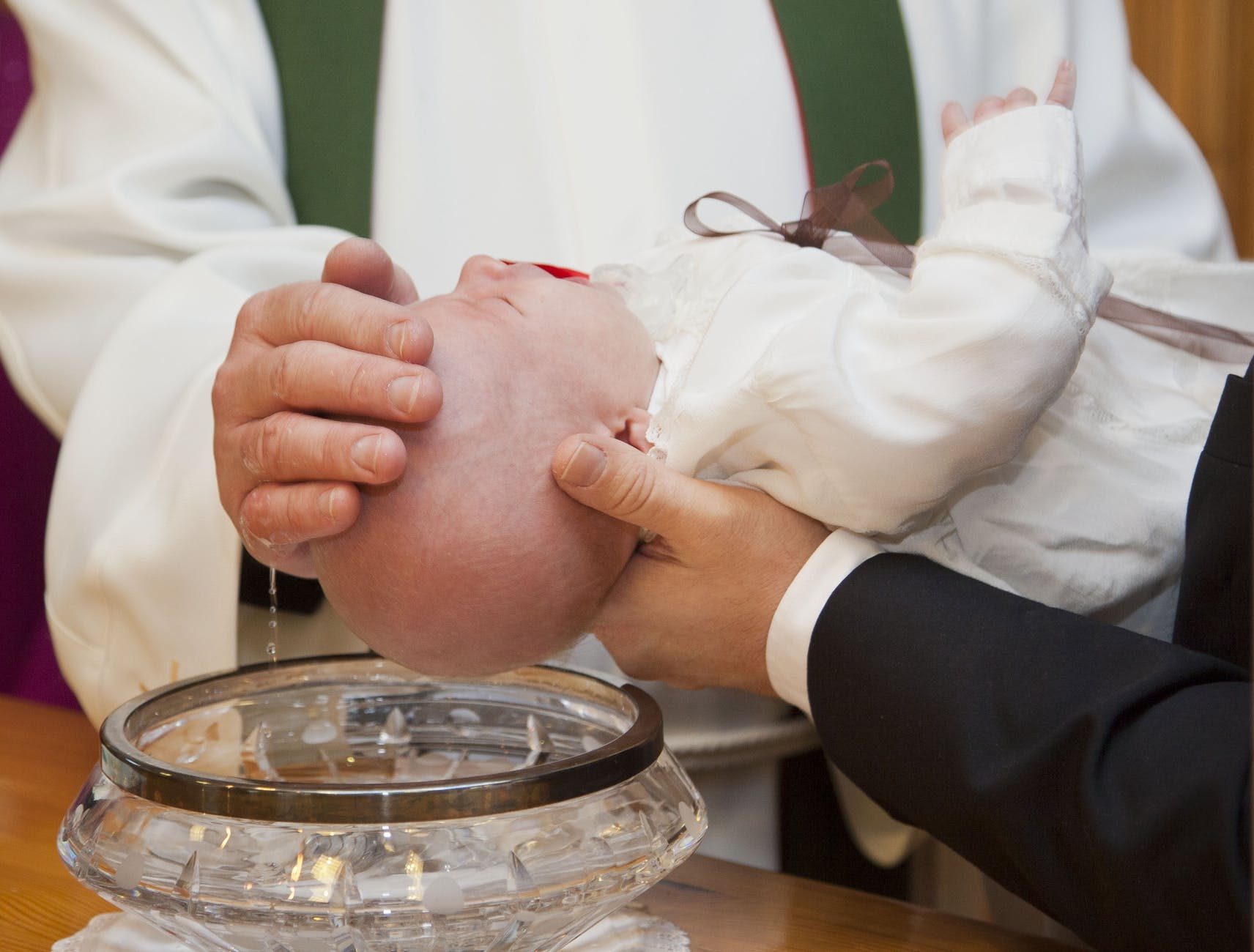What is Purgatory?
Purgatory is a place where souls go after death to be purified or “purged” of their sins. Unlike Heaven and Hell, a soul does not stay here permanently. Every soul is Purgatory will eventually go to Heaven. Most people do not go directly to Heaven, but instead go to Purgatory first. Only pure and holy things are allowed in Heaven, and since most people do not die in a state of grace (free from sin), they cannot go directly to Heaven.[1]
Purgatory is a place of purification, a “purifying fire”[2]. When we sin, even though we are forgiven, the stain of sin is still on our souls. We can purge this stain in this life through “penance”: prayers, fasting, offering up sacrifices, offering up our suffering, acts of charity, and acts of mercy.[3] The amount of penance we do on earth has a direct correlation with the amount of time we spend in Purgatory.[4]
An example may help in understanding this concept. A child arguing with his sibling at the table knocks over a glass of milk. The child is instantly sorry. He promises to behave at the table from now on. The parent forgives the child, but there is still milk on the floor and it has to be cleaned up. After we sin, we are (or should be) sorry and we promise not to do it anymore. But the stain is still there. Like the child with the milk, we can either immediately clean up the mess (by doing penance) or be stubborn and get stuck cleaning it up later when all our friends are outside playing (going to Purgatory instead of going directly to Heaven).
Purgatory is not a joyful place. In Purgatory we see all of our unconfessed and unrepented sins in comparison to God’s holiness. There is intense sorrow at the realization of our own sinfulness. We suffer greatly at the horror of how many times we ignored God’s grace in our lives and deliberately neglected to do acts of kindness, charity, and mercy. We are in agony when we realize how much God loves us and how little we loved Him in return. There is unrelenting loneliness because we are fully aware that we are not in the presence of God, unlike the souls in Heaven who continually behold His face. The purification received in Purgatory, while necessary, is extremely painful.
Purgatory Really Exists
Jesus spoke frequently of the existence of Purgatory and why souls are sent there. In Matthew (5:21-26), Jesus tells us that if we do not forgive others, we ourselves will be judged and thrown into prison (Purgatory) until the last penny is paid. In Matthew 12:36, Jesus says that for every idle word we speak (gossip), we will be held accountable on the day of Judgement. In Luke 12: 58-59, the individual is encouraged to make peace with his fellow man before they get to the judge lest the judge throw him into prison until the last mite is paid.
Why People Go To Purgatory
We freely receive forgiveness from God for our sins, but if we do not extend forgiveness to others, we will have to be cleansed of an unforgiving spirit in Purgatory. The Bible is very clear on this point. Jesus tells us many times that the measure we measure others with will be measured back to us. In the Sermon on the Mount, He tells us “blessed are they who show mercy, mercy shall be theirs” (Mt 5:7). In the parable of the unforgiving servant, one servant pleaded with his master for mercy and was forgiven a very large debt. Then he met a fellow servant who owed him a small debt, but he had him thrown into debtors’ prison. The master then became angry and threw his servant into debtors’ prison until he had paid the last penny. Jesus pointedly says, “So also My Heavenly Father will do to you, if you do not forgive your brothers from your hearts” (Mt 18:21-35). If we do not forgive others, then we have no right to ask for forgiveness for our sins. If we do not show mercy to others, God will also require us to atone for our sins in Purgatory.
Why is Forgiveness So Essential?
Our God is a God of love. He created us to love. He wishes for us to have open, loving hearts so that He can fill us with His love. He wants us to know His love and He wants us to bring His love to other people. When we refuse to forgive, we poison ourselves. We lose any peace that is in our lives. When we hold grudges, we become hostile, resentful, and bitter. We become blind to the graces that God sends us. Because we are blind, we waste these graces and we waste opportunities to share God’s love. When we are bitter, we cannot feel the love God has for us – we shut out Him and everyone else. We fail to respond to God’s love. When we understand the sacrifice Jesus made for us on the cross and His love and forgiveness that He gives us unconditionally, we can understand why God Our Father is not pleased with our ingratitude. When we do not forgive, we express ingratitude to Jesus for His sacrifice for us.
Purgatory Is Not Inevitable!
We do not have to go to Purgatory. Our God loves us so much that He gives us many opportunities to avoid it. First, and most important – forgive, forgive, forgive. The more we forgive others, the more we will be forgiven.
Second, we must abandon sin, especially mortal sins.[5] These mortal sins are clearly defined in the Bible for us. Among them are idolatry, blasphemy, slander, theft, murder, fornication, adultery, and sodomy. The seven deadly sins are: anger, lust, pride, greed, gluttony, sloth, and envy. These sins are deadly because they start as sinful thoughts but become deeply rooted in the heart where they fester, robbing us of joy and peace. Soon they make their presence known through sinful and immoral actions. It is the presence of these deadly sins in our hearts which causes us to commit mortal sins. These sins are called “mortal” and “deadly” precisely because they destroy the life of our souls and send us to hell – and eternal death. We must avoid mortal sin and break the habit of habitual sin. Sins such as gossip are extremely offensive to God, but often times we find ourselves habitually engaged in them. Become aware of these sins. Pray for the grace to stop committing them.
Third, we can do acts of penance for our sins.[6] Start with offering little penances, such as sacrificing our whims for others. Offer up each little sacrifice to God. It is far better to offer up all the little things than to plan to undertake a great task but never do it.
Fourth, offer up all our suffering to God.[7] Suffering is a part of this life, so it is best to patiently accept those things we cannot change and offer them up in union with Jesus’s suffering. When we bear our suffering for love of Him, this greatly pleases Him. We not only wipe away many years of Purgatory in this way, but we also receive consolation from God to help us endure our suffering.
Fifth, Catholics can receive the Sacrament of Reconciliation weekly, attend Mass daily and receive Communion daily.[8] The graces received in these sacraments pardon us for a multitude of sin and strengthen us to resist future sin.
Sixth, continually implore God’s mercy and pray that you will never go to Purgatory.[9] Prayers said with faith and perseverance are precious to God.
Seventh, when confronted with death, accept it as God’s will and offer it up to God. This can wipe out all Purgatory. The repentant thief on the cross learned this. He accepted his punishment for his sin (we all die because we have sinned – Rm 6:23) and Jesus, ever merciful, said to him, “Truly I say to you, today you will be with Me in Paradise” (Lk 24:43).
Eighth, Catholics can receive Extreme Unction, also known as Last Rites, or the Sacrament of the Sick. This sacrament, if devoutly received, is so powerful that it can cancel out all our time in Purgatory.[10]
Ninth, pray for the souls in Purgatory. This is an act of mercy and God returns mercy with mercy. The more prayers said for the poor souls, the sooner they will leave Purgatory. They are so grateful for your kindness toward them, that upon their release, they pray unceasingly before God that you will never be sent there.[11]
Tenth, devotion to the Blessed Virgin Mary brings us many graces. The Mother of God and our Blessed Mother is perfect in charity and prays unceasingly for us. We would do well to invoke Her intersession by praying the Rosary, [12] and faithfully wearing the Brown Scapular.[13] Because She is Jesus’s beloved mother, he delights in granting Her petitions.
The Mercy of God
In Heaven we all behold the face of God – we meet Our Father and Creator and enter into an intimate relationship with Him. In Heaven we become one with Jesus forever. If we went to Heaven with the stain of sin upon our souls, we would never be able to look at God Who is Holiness and Purity Itself. We could not have an intimate relationship with Him. Our sin would keep us forever separated from Him; we would be miserable. He does not want us to run and hide from Him as did Adam and Eve. He wants to hold us close to Him. Thus, He created Purgatory for our own good.
God created Purgatory as a final act of mercy because He loves us so much. We have many opportunities to respond to God’s love in this world, to do good works and penance, but we rarely respond to these opportunities. If Purgatory did not exist, most of us would go to hell after death because we are not pure and holy enough to go to Heaven. But God created us out of love – he wants us with Him in Heaven! So He created purgatory where we could be purged of all unholiness. Then, when our purification is complete, we can enter into Heaven and dwell with Him for all eternity.
Jesus, Son of the living God, have mercy on me, a sinner.
Recommended Reading
How to Avoid Purgatory, by Fr. Paul O’Sullivan, Tan Books and Publishers, Inc. Publication has the Imprimatur of the Church.
[1] Catechism of the Catholic Church, Liguori Publications, 1994. Paragraph #1030.
[2] Ibid., #1031.
[3] How to Avoid Purgatory, by Fr. Paul O’Sullivan, O.P., Tan Books and Publishers, pages 4,6,7,9.
[4] Ibid., p.6.
[5] Ibid., p. 4.
[6] Ibid., p. 6.
[7] Ibid., p. 9.
[8] Ibid., p 11
[9] Ibid., p.13.
[10] Ibid., p. 17.
[11] Ibid., 23.
[12] Ibid., 20.
[13] Ibid., 34.





